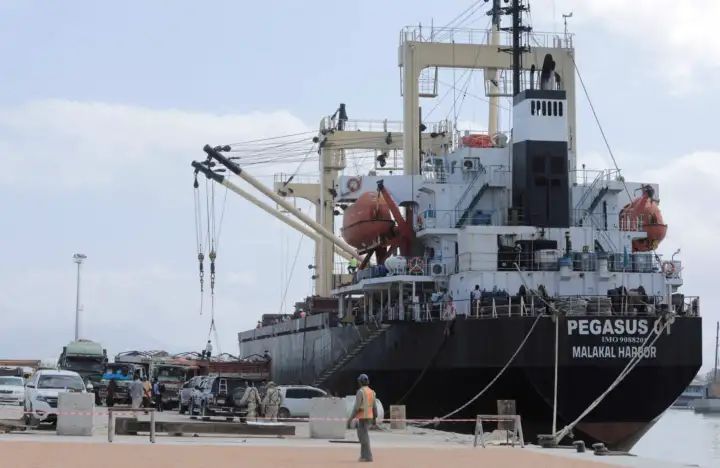Somali pirates return, amplifying global shipping concerns: Report

The maritime industry is facing renewed challenges as Somali pirates return to the seas, adding to the existing global shipping crisis.
As reported by Reuters, the recent incident involving a Bangladeshi-owned bulk carrier, the Abdullah, highlights the escalating threat.
Despite sending out distress signals, the crew was unable to prevent the pirates from boarding the vessel and taking the captain and second officer hostage.
Chief Officer Atiq Ullah Khan, in an audio message to the ship’s owners, reassured, “By the grace of Allah no one has been harmed so far.”
However, the pirates confiscated the crew’s phones shortly after.
The Abdullah is currently anchored off the coast of Somalia, becoming the latest victim in the resurgence of piracy that international navies had previously believed to be under control.
Rising Incidents and associated costs
Since November, more than 20 attempted hijackings have been reported, driving up costs for armed security guards and insurance coverage.
Industry representatives indicate that the recent surge in piracy has also raised concerns about potential ransom payments.
Two Somali gang members disclosed that they are exploiting the distractions caused by Houthi strikes to resume piracy activities after nearly a decade of dormancy.
Reuters cited a pirate financier known as Ismail Isse, who said, “They took this chance because the international naval forces that operate off the coast of Somalia reduced their operations.”
Isse, who helped fund a previous hijacking, spoke to Reuters from Hul Anod, a coastal area in Somalia’s semi-autonomous north-eastern region of Puntland.
While the current threat level is not as severe as it was between 2008 and 2014, regional officials and industry sources express concerns that the problem could escalate further.
Somali President Hassan Sheikh Mohamud highlighted the importance of addressing the issue early, stating, “If we do not stop it while it’s still in its infancy, it can become the same as it was.”
International responses and deterrence efforts
Over the weekend, the Indian Navy successfully intercepted and freed the Ruen, a ship sailing under Malta’s flag, which may have been used as a launchpad for attacking the Abdullah.
All 35 pirates aboard surrendered, and the 17 hostages were rescued without injuries.
Cyrus Mody, deputy director of the International Chamber of Commerce’s anti-crime arm, commented on the intervention.
“This intervention does show that the risk/reward is very much against the pirates, and hopefully that will make them think a few times over,” he said.
However, a Bangladeshi foreign ministry official expressed reservations about military interventions close to the Somali coast.
The official highlighted the advantages pirates possess in these waters and indicated that the government was “not in favour of any kind of military action” to free the Abdullah.
Economic impact and security measures
The waters off Somalia are among the world’s busiest shipping lanes, with an estimated 20,000 vessels passing through annually.
At their peak in 2011, Somali pirates launched 237 attacks, holding hundreds of hostages and costing the global economy about $7 billion, including ransoms.
Although the current rate of attacks is lower, the pirates are primarily targeting smaller vessels in less patrolled waters.
The escalating threat has led to an increase in war risk premiums and private armed guard costs.
Insurance industry officials report that premiums are becoming more expensive for voyages through the Gulf of Aden and Red Sea, adding hundreds of thousands of dollars to typical voyage costs.
The cost to hire a private armed guard team has surged by around 50 per cent in February, ranging between $4,000 and $15,000 for a three-day period.
International collaboration and future strategies
In response to the previous wave of piracy attacks, international navies had deployed up to 20 warships from 14 different countries to patrol the Gulf of Aden and Indian Ocean shipping lanes.
While these measures significantly reduced pirate attacks, the subsequent reduction in the number of patrolling warships has allowed piracy to resurface.
John Steed, former head of the counter-piracy unit at the UN Political Office for Somalia, highlighted the inconsistency in patrolling efforts, stating, “Countries’ ships dip in and out of the various missions and back to national command.”
EUNAVFOR, the US State Department, and the British navy have all expressed their commitment to assisting Somalia in tackling piracy but have not commented on whether patrols are stretched too thin or if additional resources will be allocated.
Somalia’s role and law enforcement capacity
President Mohamud noted the need to bolster Somalia’s law enforcement capacity at sea and on land, rather than relying solely on international ships.
Despite having 720 trained members in the coast guard, only one of its four boats is functional.
Limited resources also plague the maritime police forces in Mogadishu, Puntland, and the breakaway Somaliland region.





